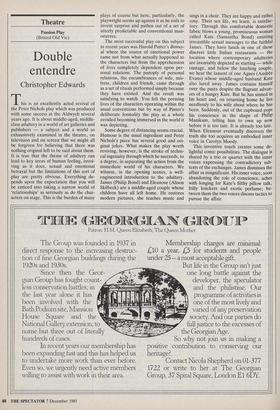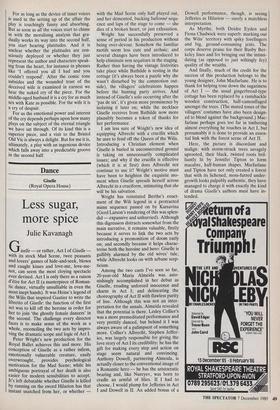Theatre
Passion Play (Bristol Old Vic)
Double entendre
Christopher Edwards
This is an excellently acted revival of the Peter Nichols play which was produced with some success at the Aldwych several years ago. It is about middle-aged, middle- class adultery in a world of art galleries and publishers — a subject and a world so exhaustively examined in the theatre, on television and on screen that we might all be forgiven for believing that there was nothing original left to be said about them. It is true that the theme of adultery can lead to key areas of human feeling, invol- ving as it does, sexual and emotional betrayal but the limitations of this sort of play are pretty obvious. Everything de- pends upon the expectation that you will be enticed into taking a narrow world of `relationships' as seriously as do the char- acters on stage. This is the burden of many plays of course but here, particularly, the playwright seems up against it as he toils to invent surprise and pathos out of a set of utterly predictable and conventional man- oeuvres.
The most successful play on this subject in recent years was Harold Pinter's Betray- al where the source of emotional power came not from what actually happened to the characters but from the apprehension of lives completely dependent upon per- sonal relations. The panoply of personal relations, the encumbrances of wife, mis- tress, children and friends, came through as a set of rituals performed simply because they have existed. And the result was satisfying to watch. You felt the pressing lives of the characters operating within the usual conventions but by way of Pinter's deliberate formality the play as a whole avoided becoming immersed in the world it was depicting.
Some degree of distancing seems crucial. Humour is the usual ingredient and Peter Nichols's piece has several good and ori- ginal jokes. What makes the play worth reviving, however, is the stroke of techni- cal ingenuity through which he succeeds, to a degree, in separating the action from the immediate world of his characters. We witness, in the opening scenes, a well- engineered introduction to the adultery. James (Philip Bond) and Eleanour (Alison Skilbeck) are a middle-aged couple whose children have all left home. He restores modern pictures, she teaches music and sings in a choir. They are happy and rather. cosy. Their sex life, we learn, is satisfac- tory. Through this comfortable domestic fabric blows a young, promiscuous woman called Kate (Samantha Bond) emitting irresistible sexual messages to the faithful James. They have lunch in one of those discreet little Italian restaurants — the location where contemporary adulteries are invariably depicted as starting — while onstage, and below the lunching couple, we hear the lament of one Agnes (Andree Evans) whose middle-aged husband Kate also lured away. James contains himself over the pasta despite the flagrant advan- ces of a hungry Kate. But he has sinned in his heart and, on returning home he lies needlessly to his wife about where he has been. Suddenly, out of the cupboard pops his conscience in the shape of Philip Manikum, telling him to own up now before it is too late. It is already too late. When Eleanour eventually discovers the truth she too acquires an embodied inner voice in Carolyn Moody.
This inventive touch creates some de- lightful comic possibilities. The dialogue is shared by a trio or quartet with the inner voices expressing the contradictory sub- texts of the exchanges. James dismisses the affair as insignificant. His inner voice, soon abandoning the role of conscience, aches with longing for Kate's filthy pillow talk, frilly knickers and exotic perfume; be- tween them the two voices discuss tactics to pursue the affair. For as long as the device of inner voices is used in the setting up of the affair the play is touchingly funny and absorbing. But as soon as all the voices start to chime in with the moralising analysis that gra- dually works its way into the second half, you start hearing platitudes. And it is unclear whether the platitudes are con- sciously deployed or whether they just represent the author and characters speak- ing from the heart, for instance in phrases like 'I offered you all I had and you couldn't respond'. After the comic tone subsides and the wounded trust of the deceived wife is examined in earnest we hear the naked cry of the piece. For the middle-aged husband it is a cry for as much sex with Kate as possible. For the wife it is a cry of despair.
For us the emotional power and interest of the cry depends perhaps upon how many plays on the subject of the eternal triangle we have sat through. Of its kind this is a superior piece, and a visit to the Bristol Old Vic is always a delight. But for me it is, ultimately, a play with an ingenious device which falls away into a predictable groove in the second half.



































































 Previous page
Previous page